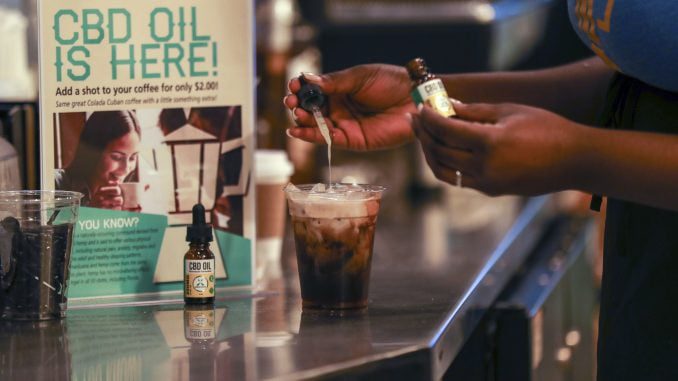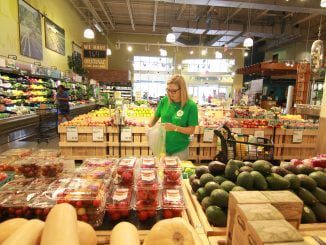
RALEIGH — From candy to soda to pizza, a compound called CBD is weaving its way inside menus and health supplement stores across the country. But what is CBD?
Cannabidiol, most often called CBD, is a compound that comes from the cannabis plant. CBD acts on different parts of the nervous system than tetrahydrocannabinol (THC), the chemical compound in cannabis responsible for euphoric highs. CBD isn’t considered a mind-altering substance and doesn’t produce a “high” like THC.

Throughout the human body, there are cannabinoid receptors that have influence over one’s perception or feelings of pain or even how hungry we are.
There are two types of receptors called CB1 and CB2.
CB1 receptors are located in the nervous system and brain, but can also be found in the lungs, liver, kidneys and reproductive organs. When activated, CB1 receptors play a part in moods, motor coordination, sleep regulation and hunger.
CB2 receptors are found in the immune system tissues, and when these receptors are activated, they work to alleviate swelling or inflammation.
Many claim that CBD helps with insomnia, arthritis, nerve pain, depression and even epilepsy.
According to the Center for Disease Control, scientists think CBD may help children who have seizures where other medications have failed and that studies have been started to test the theory.
Cannabidiol can be synthesized and “fake” or “counterfeit” versions of the compound made dozens of people ill between October 2017 and January 2018.
In December of 2018, the Food and Drug Administration (FDA) released a statement on hemp being removed from the list of controlled substances as a result of the signing of the Agriculture Improvement Act of 2018.
The FDA’s statement also singles out the use of CBD in food, stating is it “unlawful under the Food Drug & Cosmetic Act to introduce food containing added CBD or THC into interstate commerce, or to market CBD or THC products as, or in, dietary supplements, regardless of whether the substances are hemp-derived.”
In a nutshell, the FDA’s statement warns that CBD has not been approved by the FDA, that the agency regards the substance as illegal — especially in food items or supplements.
While CBD is making the rounds on menu’s it’s also starting to make appearances in state laws.
A law currently moving through the Virginia legislature, SB 1632, takes aim at CBD oil use by teens. SB 1632 would require that “written certification” for use at school. The bill also bars a school or district from suspending or expelling a student who has certification to use the product.
In California, the Los Angeles County’s Department of Public Health is putting businesses on notice that beginning this July, CBD in food products can cost them two points on their inspections.
In North Carolina, lawmakers might have to give CBD a look, as one state agency is already sending out letters to businesses on the topic.
According to a press release sent out by the Department of Agriculture and Consumer Services, letters are going out to “manufacturers and retailers who sell products containing CBD oil” informing them the product cannot be legally added to foods.”
“Under federal Food and Drug Administration laws, CBD is considered a drug,” said Joe Reardon, NCDA&CS assistant commissioner of consumer protection, in the press release. “North Carolina state laws mirror federal laws. This means that CBD cannot legally be added to any human food or animal feed that is for sale.”
“We are taking an educate before regulate stance with industry,” Reardon said.
The press release also says that CBD products being sold cannot make health claims, “including statements that the product may prevent, treat or cure any disease” and that businesses in violation may see their products “embargoed or seized.”
“I have some of the same concerns that the Dept, of Agriculture has on some of the ingested CBD products. I think we need better regulation on testing for THC content and heavy metal and pesticides on any CBD products to be ingested,” said Deputy Majority Whip Rep. Pat McElraft (R-Jones, Carteret) in an email to North State Journal.
“I think CBD oil has some medicinal purposes and has been working well for the children with Epilepsy and others with cancer etc.,” said McElraft. “We now have an FDA cleared CBD oil for Intractable Epilepsy called Epidiolex that requires a prescription.”
McElraft explained that the U.S. Farm Act of 2014 allowed hemp with less than a 0.3 percent THC concentration to be sold in the United States, but said that the problem is that no one knows what level of THC is in some of the CBD products being sold in some shops.
“We need to regulate them and make sure they have independent lab testing for harmful ingredients. We also need to make sure they are not exceeding the 0.3 percent THC level,” McElraft said.
McElraft said she intended to meet with officials in the Department of Agriculture to see if she could help with legislation.
The Department of Agriculture release says that business owners with questions or concerns about CBD and the regulation of it should contact the Food and Drug Protection Division at 919-733-7366.




